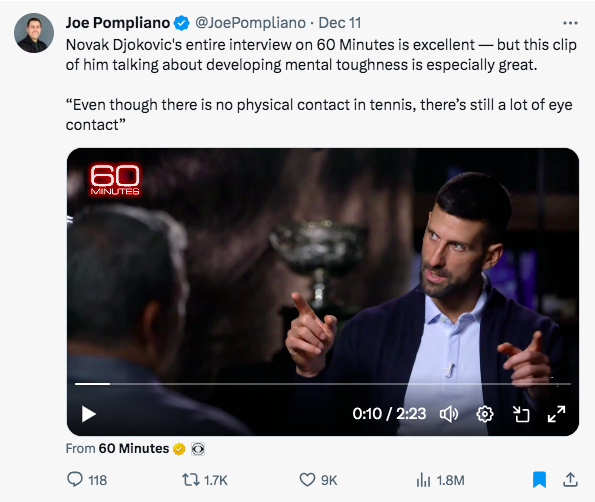You and I may never be able to do what some elite leaders do. For instance, I will never have the skill set of someone like tennis legend Novak Djokovic. I lack his stamina, flexibility, power, and athletic skill set. But I can learn how someone like Djokovic thinks about things like preparation, teamwork, handling pressure and then mirror his approach.
The G.O.A.T.
The resume is unmatched:
- 10 Australian Open championships
- 3 French Open championships
- 7 Wimbledon championships
- 4 U.S. Open championships
- A record 24 major championships in all
Novak Djokovic is the greatest men’s tennis player of all-time.
Recently, he was profiled on the December 10th episode of 60 minutes by Jon Wertheim. Djokovic gave us a masterclass on how elite leaders think. Click HERE or on the image below for a portion of their interview. Afterwards, I will provide a transcript from their time together followed by five things elite leaders think about that average leaders don’t.
Transcript
Djokovic – “Even though there is no physical contact in tennis, there’s still a lot of eye contact. When we are changing ends, when we’re sitting on the bench, and then the big screen shows him how he drinks his water. And then I’m looking at him. How is he drinking water? Is he sweating more than usual? Is he breathing…”
Wertheim – “Wow. You’re takin’ all of this in during a match?”
Djokovic – “Exactly. Is he breathing deeply or not deeply? And then I look how he’s communicating with his team, you know. You have all these different elements that are in play that really affect the performance and the game itself.”
Wertheim – “Can I tell you what one of the hardest things about covering you is? People understand big muscles and speed and grace. Mental strength, which is what I think is your great gift, is much harder to articulate. Can you help us explain…”
Djokovic – “I would have to correct you. I’d have to correct you…”
Wertheim – “Yeah, all right. Correct me…”
Djokovic – “It’s not a gift. It’s something that comes with work.”
Wertheim – “You train for the mental side the way you would your serve or your…”
Djokovic – “Absolutely.”
Wertheim – “…your forehand. How?”
Djokovic – “Absolutely. Well, there are different techniques. Conscious breathing is a big part, especially in the moments when you’re under tension.”
Wertheim – “I think a lotta people think, ‘Oh in the moment, Novak’s so locked in.’ You’re saying this is all part of a process?”
Djokovic – “Oh, I mean I might appear maybe locked in. But, you know, trust me, there is a storm inside. And, you know, the biggest always battle is within, right?”
Wertheim – “Take us in there. It’s…”
Djokovic – “Yeah, I mean, you know, you have your doubts and fears. I feel it every single match. I don’t like this kind of a mindset that I see a lot in sports. Like, ‘Just think positive thoughts. Be optimistic. There is no room for failure. There is no room for, you know, doubts,’ and stuff like this. It’s, it’s impossible to do that…”
Wertheim – “You don’t buy that?”
Djokovic – “You are a human being. The difference, I guess, between the guys who are able to be biggest champions, and the ones that are struggling to get to the highest level is the ability to not stay in those emotions for too long. So, for me, it’s really relatively short. So as soon as I experience it, I acknowledge it. I maybe, you know, burst. I scream on the court, whatever happens. But then I’m able to bounce back and reset.”
5 Things Djokovic Constantly Thinks About That Average Leaders Don’t
Djokovic Constantly Thinks About Gaining Advantages
Djokovic is constantly looking for outside-the-box advantages he can get. He said, “When we are changing ends, when we’re sitting on the bench, and then the big screen shows him how he drinks his water. And then I’m looking at him. How is he drinking water? Is he sweating more than usual? Is he breathing deeply or not deeply? And then I look how he’s communicating with his team, you know. You have all these different elements that are in play that really affect the performance and the game itself.”
Big screens, how much water is drank, the amount of sweat, breathing patterns, and how his opponent is communicating with his team. These are just some of the unique places Djokovic finds advantages. Brilliant insights!!!
Where are you looking for advantages in your industry?
Djokovic Constantly Thinks About Hard Work
Djokovic said, “It’s not a gift. It’s something that comes with work.” Hard work works. GOATS smell like sweat. Djokovic is constantly thinking about his energy management and how best to leverage this precious resource for success.
Djokovic Constantly Thinks About Better Ways To Handle Pressure
Djokovic actually has physical approaches to address his mental concerns. He said, “Well, there are different techniques. Conscious breathing is a big part, especially in the moments when you’re under tension.”
Djokovic Constantly Thinks About His Fears And Concerns
This was counter-intuitive. Djokovic takes a different approach to his fears and concerns than many elite performers. He admits them, calls them out, refuses to deny them, and then addresses it head-on. Djokovic admitted, “Oh, I mean I might appear maybe locked in. But, you know, trust me, there is a storm inside. And, you know, the biggest always battle is within, right?”
He adds, “Yeah, I mean, you know, you have your doubts and fears. I feel it every single match. I don’t like this kind of a mindset that I see a lot in sports. Like, ‘Just think positive thoughts. Be optimistic. There is no room for failure. There is no room for, you know, doubts,’ and stuff like this. It’s, it’s impossible to do that…”
Djokovic Constantly Thinks About Emotional Discipline
Djokovic is the living embodiment that the difference between successful and unsuccessful leaders is how they think. He noted, “The difference, I guess, between the guys who are able to be biggest champions, and the ones that are struggling to get to the highest level is the ability to not stay in those emotions for too long. So, for me, it’s really relatively short. So as soon as I experience it, I acknowledge it. I maybe, you know, burst. I scream on the court, whatever happens. But then I’m able to bounce back and reset.”
As a leader, do you have emotional discipline? Do you acknowledge disappointments and quickly reset?
Conclusion
Once again, you and I will never be able to play tennis like Novak Djokovic but we can learn how he thinks.
Gaining Advantages. Hard Work. Handling Pressure. Fears and Concerns. Emotional Discipline.
Think on these five things and you will a chance to become elite in your industry.
My latest eBook is available for download. The Top 65 Leadership Quotes Of 2022 Part 1 is a resource every leader should have. Great quotes bring clarity and put into words who we intuitively feel as leaders. They give us wisdom and insights which advance the mission and vision of our organizations. This eBook includes thoughts and insights from leaders like Warren Buffett, Nick Saban, James Clear, Dawn Staley, Jurgen Klopp, Jerry Seinfeld, and even Ted Lasso. This resource will take you about 10 minutes to read but a lifetime to apply. You will want to stop and ponder the implications of each quote. Click HERE or on the image provided for immediate download!


